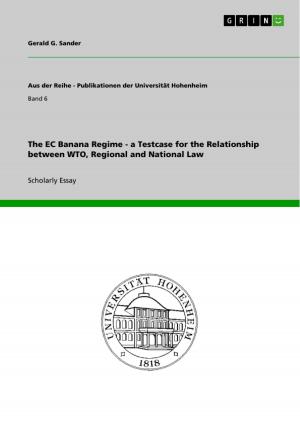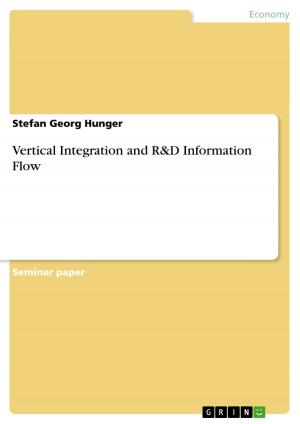Why do democratic states not fight each other? A systemic approach to the democratic peace
Nonfiction, Social & Cultural Studies, Political Science, Politics, History & Theory| Author: | Simon Oerding | ISBN: | 9783640299478 |
| Publisher: | GRIN Publishing | Publication: | March 25, 2009 |
| Imprint: | GRIN Publishing | Language: | English |
| Author: | Simon Oerding |
| ISBN: | 9783640299478 |
| Publisher: | GRIN Publishing |
| Publication: | March 25, 2009 |
| Imprint: | GRIN Publishing |
| Language: | English |
Bachelor Thesis from the year 2006 in the subject Politics - Political Theory and the History of Ideas Journal, grade: 1,0, Manchester Metropolitan University Business School (Department of Politics), course: BA Thesis, 59 entries in the bibliography, language: English, abstract: Abstract There is no regularity in international relations that is as imperturbable as the democratic peace. From the beginning of the statistical research in 1816 until today, no clear-cut case of war between two democratic states has been recorded. The democratic peace has obstinately kept the secret of its causal mechanism. No convincing theory as to its cause has been widely accepted. It is the aim of this dissertation to provide an alternative explanation for why democracies do not fight each other. Empirical research can only account for correlation but not for causal mechanisms. This dissertation thus concentrates on the theoretical explanations. Scholars developed approaches to account for the democratic peace ranging from constructivist through the sociological to game-theoretical methodology. They focus on the single democratic state, the relation between two democratic states and, recently, the international system itself. This dissertation critically examines a number of such theories which vary in methodology and focus. Especially, arguments by Russett, Doyle and Müller are given attention, but, to a greater or lesser extent, they are flawed or insufficient. At the same time, this dissertation points out a number of special characteristics of democratic states of importance. Pulling those together, an approach is proposed based on the assumption that the international system itself bears a major responsibility for the democratic peace. Supporting an approach by Hasenclever, it is argued that international institutions set up by democratic states are especially capable of mitigating conflicts and thus prevent war. Together with the special features of their member-states, such organisations account for the peaceful behaviour of democracies.[...]
Bachelor Thesis from the year 2006 in the subject Politics - Political Theory and the History of Ideas Journal, grade: 1,0, Manchester Metropolitan University Business School (Department of Politics), course: BA Thesis, 59 entries in the bibliography, language: English, abstract: Abstract There is no regularity in international relations that is as imperturbable as the democratic peace. From the beginning of the statistical research in 1816 until today, no clear-cut case of war between two democratic states has been recorded. The democratic peace has obstinately kept the secret of its causal mechanism. No convincing theory as to its cause has been widely accepted. It is the aim of this dissertation to provide an alternative explanation for why democracies do not fight each other. Empirical research can only account for correlation but not for causal mechanisms. This dissertation thus concentrates on the theoretical explanations. Scholars developed approaches to account for the democratic peace ranging from constructivist through the sociological to game-theoretical methodology. They focus on the single democratic state, the relation between two democratic states and, recently, the international system itself. This dissertation critically examines a number of such theories which vary in methodology and focus. Especially, arguments by Russett, Doyle and Müller are given attention, but, to a greater or lesser extent, they are flawed or insufficient. At the same time, this dissertation points out a number of special characteristics of democratic states of importance. Pulling those together, an approach is proposed based on the assumption that the international system itself bears a major responsibility for the democratic peace. Supporting an approach by Hasenclever, it is argued that international institutions set up by democratic states are especially capable of mitigating conflicts and thus prevent war. Together with the special features of their member-states, such organisations account for the peaceful behaviour of democracies.[...]















